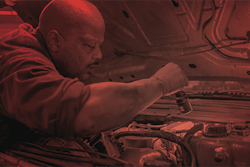State of New Jersey will pay $8.25 million in refunds and attorneys’ fees as part of a settlement with the American Trucking Associations over fees assessed under its A-901 program related to hazardous materials haulers. The state also agreed to refrain from collecting any A-901 fees until new rules are adopted.
Covenant Transport said that its earnings per share for the second quarter will be in the range of 2 cents to 8 cents – well below the 30 cents per share recorded in the second quarter of 2004. “The main factor affecting the quarter is a continuation of softer-than-expected freight demand,” said Chairman David Parker. “Other than a brief period of increased demand in late April and early May, our customer demand has not improved to the seasonal level we expected or needed.”
First Advantage Corp. (www.fadv.com) renamed CompuNet Credit Services to First Advantage. The broker/shipper credit reporting service, acquired in November 2004, will be marketed under First Advantage Corp.’s Transportation Services division.
Owner-operators reported the highest per-mile maintenance expenses, according to a Heavy Duty Manufacturers Association study. Owner-operators averaged 25 cents per mile, well ahead of construction fleets, which paid 20 cents per mile on average. Other averages were 16 cents per mile for commercial carriers; 15 cents per mile for private fleets; 14 cents per mile for agriculture/mining/ forestry; and 12 cents per mile for production/distribution fleets.
After 35 years in transportation financing, CPA Mitch Poole has some ideas on how controllers and chief financial officers at trucking companies can be more effective in helping their companies grow. Poole served with Arthur Andersen in Atlanta for 18 years, many of them as the Southeastern head of the Transportation Industry Practice, and as a financial professional for 17 years in the transportation industry, including trucking.
What’s the secret of a great career in finance? “First, understand things from your manager’s perspective,” Poole offers. “Step out of your financial box and say, ‘I’ve got to understand what they do every day’ in order to truly know what pressures and difficulties they have.” Only then can you recommend solutions that operations will accept, he says.
“Everyone knows that finance and accounting does not haul a single load or generate a dollar of revenue,” Poole says. “So we have to first understand the business and the issues that affect the front-line employees and managers in order to best serve them.” The financial leader’s relationship with other key players must be nurtured and developed carefully as the company grows, Poole says.
In working to achieve as a financial professional, Poole knew that if he maintained this “in the trenches” orientation with each of the managers he served, that they would be more apt to listen to and consider adopting his recommendations, and see him as a team member trying to help, not as a white shirt that didn’t really understand.
Continued personal development also helps financial professionals achieve and maintain success. Plenty of reading, attending continuing education, and talking to peers help keep professionals abreast of the latest trends and solutions.
For self-development, one of my favorite resources is WG&L’s Controllership Guide published by RIA Group / Warren, Gorham & Lamont. Chapter 2 is entirely about “The Controller’s Management Role.”
Giving your financial professionals training and fresh ideas and perspectives will always benefit your company in the long run, and make them an integral part of your team.
Resources
Business Research Library Listing for Controllers, CFOs, courtesy of the Illinois Society of CPAs, at this site.
Institute of Management Accountants, representing accountants and finance professionals working inside business organizations, at this site.
Sharp rise in truck repossessions
Nassau Asset Management reported a 45 percent increase in the volume of truck repossessions when comparing the first quarter of 2005 to the same quarter of 2004, but cautioned against declaring a trend. This was the first quarter since 2002 that Nassau saw a significant increase in repossessions and liquidations, said Edward Castagna, senior executive vice president of the New York asset management company.
Higher fuel prices, higher insurance premiums and an overall economic slowdown may have contributed to the spike in truck repossessions, Nassau said. Also, an increase in lending by Nassau’s clients may have resulted, inevitably, in more leases and loans subject to default this year.
While the rise in truck repossessions was steep, the increase was far from the highest in the overall economy. Other types of equipment saw a much steeper increase in repossessions. For example, repossession of medical devices increased 258 percent, personal computers 79 percent. On the other hand, repossessions of construction equipment increased only 13 percent, while repossessions of machine tools actually decreased 44 percent.
Installments gone on heavy vehicle tax
Internal Revenue Service is reminding truck owners that the installment option for paying the federal heavy vehicle use tax is no longer available, effective with the Form 2290 for the tax year that began July 1, 2005. The balance due must be paid in full by the due date of the return, which in most cases is Aug. 31. Last year, about 148,000 truck owners chose to pay the highway use tax in four installments rather than in a lump sum.
The elimination of the installment option was included in the American Jobs Creation Act of 2004, which also eliminated reduced rates for vehicles registered in Canada and Mexico and made electronic filing mandatory for taxpayers who file highway use tax returns for 25 or more vehicles.








